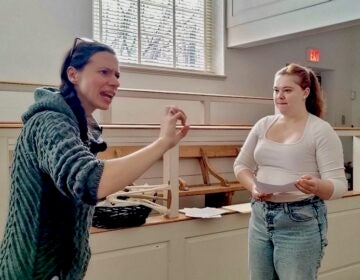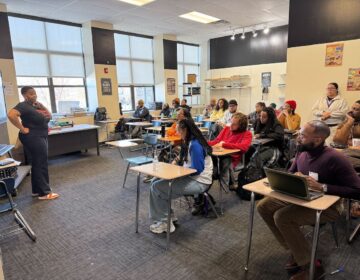Exposing students to urban farming
Henry Got Crops is one of the first Community Supported Agriculture programs in Philadelphia.
For the students at W.B. Saul High School, the concept of farming is far from foreign. The Roxborough-based specialty school focuses on all aspects of agriculture from animal husbandry to greenhouse management. Cows, horses and sheep roam the school’s 13-acre pasture.
Still, students were somewhat out of their element when the public school started a community supported agriculture program on its Henry Avenue grounds last spring.
The program is a joint effort between Saul High School and Weavers Way Co-op. It provides the students with hands-on experience in organic vegetable farming and gives local residents the opportunity for weekly shares of the farm’s year-round yield.
A few students had helped their parents grow vegetables in the family garden, but most had limited experience planting and harvesting produce on a small-scale urban farm.
“I had a great deal of students who didn’t even know what three-quarters of these vegetables, number one, looked like, tasted like or had any idea where they came from,” said Barbara Brown, a teacher in Saul’s horticulture department.
Henry Got Crops!, one of Philadelphia’s first high school based CSAs, aims to bridge that knowledge gap while giving students a first-hand look at the natural processes that take place before a piece of produce hits the supermarket shelf.
In doing so, the hope is that students walk away from the program knowing that they too could run their own small-scale farm in the city.
Expanding a community partnership
Last month, 50 Saul students joined staff members from Weavers Way Farms to begin preparing the two-acre farm for the winter.
“The school has the land. The school has the hands. They have the ability to manage the money and foster two farmers paid on the shares,” said Jessica McAtamney as her students removed rotten yellow squash for composting.
McAtamney, a Saul teacher who helped expand the community partnership between the school and Weavers Way, said she brings her agro-ecology students to the farm about 75 percent of the time while weather permits.
Nearly half of the school’s 600 students participate in the Henry Got Crops! program. Many Saul teachers from other departments use the farm to supplement classroom curriculum as well but McAtamney incorporates it into her lesson plans more than most.
That’s just fine with her students.
While the work is physically demanding, Jubar Khan, a senior at Saul, said it’s gratifying to hand local, chemical-free produce each week to the CSA’s 130 members, including several Saul teachers.
“People use chemicals because it’s fast money, but if you grow something organically, it’s more expensive, but it’s better for your health,” said Khan.
The produce tastes better too, said Khan, who jokes around with his mother about whose tomatoes are better. “The tomatoes taste way sweeter. My mom’s are kind of bitter,” he said with a smile as he helped clear a basil bed for a cold-weather crop.
Introducing healthier options
The Henry Got Crops! farm grows about 40 different types of vegetables in multiple varieties, including 12 types of tomatoes.
Nina Berryman of Weavers Way Farms helps manage the Roxborough farm and the educational programs there. She says she considers favorites when choosing crops, but also wants students to taste new vegetable varieties.
That’s how sophomore, Yona Hudson, discovered ground cherries, which are cherry-sized tomatoes that grow in papery husks.
“I didn’t know what they were, but I just tried them and I love them now,” said Hudson.
For Brown, introducing students to healthier eating options is critical. Many of her students come from neighborhoods filled with corner stores rather than nearby supermarkets. “[The program] really turns them on to a whole area that’s not potato chips and soda,” said Brown.
The cost of community farming
But despite the educational and health benefits, Berryman said the program is currently facing a deficit. Expenses, which include salaries and seeds, have outpaced profits from CSA membership fees. Those membership fees range from $400-$710 a year depending on the amount of food received.
CSA memberships help cover the business end of the farm but not the education component.
Weavers Way Community Programs, a nonprofit arm of the Weavers Way Co-op, is currently in a grant-seeking process for education funding.
McAtamney said more programs like Henry Got Crops! should sprout up all over Philadelphia. That way every student can be part of the city’s ever-evolving environmental sustainability movement.
“The kids sense that they’re part of a larger foundation,” she said. “They’re starting to see that it’s in the news and the hot topic and they’re happy to be a piece of it.”
WHYY is your source for fact-based, in-depth journalism and information. As a nonprofit organization, we rely on financial support from readers like you. Please give today.




